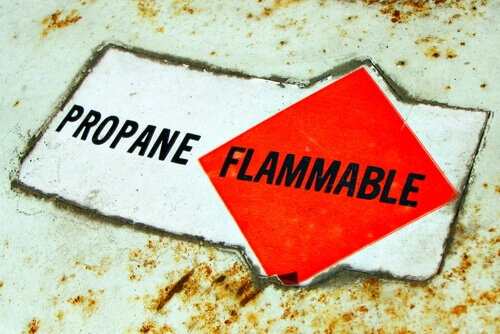
Natural and propane gas explosion can occur for any number of different reasons. Understanding the varying similarities and differences among the gases themselves is what we’ll explore in this article, as well as some of the reasons why an explosion may occur.
Natural gas and propane gas are most commonly used as fuel types nowadays. Propane gas (along with butane, ethane, and pentanes) is actually a byproduct of natural gas processing. It is produced when raw natural gas goes through acid gas removal, dehydration, mercury removal, and other procedures to convert it into sales gas, which is what end users receive.
Natural Gas and Propane Gas Similarities
In terms of physical properties, natural gas and propane gas have similar characteristics. As the National Association of Fire Investigators notes, both of these gases have almost the same energy densities per unit mass. They also have the same level of laminar premixed flame burning velocities.
The two gases are similar in that they’re widely used among various industries. Natural gas is used as cooking and heating fuel in homes and is a part of the manufacturing process for steel, glass, paint, fabrics, plastics, and many other products. It’s also used to produce hydrogen (for hydrogen-powered vehicles and other applications) and ammonia (for fertilizers). Propane, meanwhile, is used in portable stoves and barbecues as well as heating systems for campers and RVs. It’s also used in portable refrigeration and as motor fuel, and it’s popular among industries that require require portable heat.
Natural Gas and Propane Gas Differences
While these gases have similar energy densities per unit mass, they have different relative densities. Natural gas is lighter than air, whereas propane gas is heavier than air. This means that, when there is a leak, natural gas rises to the ceiling while propane accumulates at the lowest parts of the structure, such as the basement and even sewer drains.
Because of its higher density, propane gas can be easily placed in containers and stored onsite on the end user’s premises. This is why it’s popular among those who require portable fuel sources for cooking, heating, and refrigeration. Natural gas, meanwhile, is difficult to store and is usually only available through a connection to a pipeline network.
While propane gas offers more convenience to users, it also exposes them to propane gas explosion burns and other injuries. Studies have shown that, while methane (the major component of natural gas) has low reactivity levels, propane is considered to have medium reactivity and is therefore more prone to exploding. Researchers have also discovered that propane has twice the maximum rate of pressure rise of methane. This means it results to a higher explosion severity, causing serious injuries on burn victims and even leading to high death rates.
Propane gas explosion severity is illustrated in the explosion that took place at the Herrig Brothers Feather Creek Farm in Iowa on April 1998. The farm had a tank that contained 18,000 gallons on propane, and above-ground pipes leading from the tank were damaged when an all-terrain vehicle crashed into them. The damaged pipes allowed propane to leak, which eventually resulted into a fire that engulfed the tank. The heat from the fire caused temperatures to rise within the tank, resulting into an explosion that was termed a Boiling Liquid Expanding Vapor Explosion (BLEVE). Several firefighters who had rushed to the scene became burn victims, and two of them were even killed by tank fragments.
Contact Us Now
If you have incurred burns from a propane gas explosion at work or any other place, you deserve to receive the right amount of compensation for the trauma you’ve suffered. Call McEwen Law Firm to get the help of experienced attorneys who specialize in burn injuries.
Serving clients in the: Minnesota Area including Minneapolis, Minnesota, St Paul, Twin Cities, Bloomington, and throughout the United States. Hennepin County, Carver County, Wright County, Scott County, Dakota County, Anoka County, Washington County, and Ramsey County.



